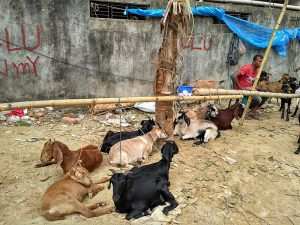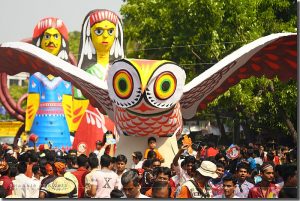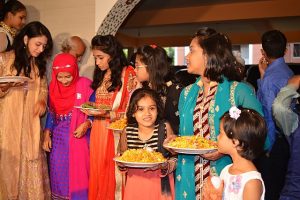Breathtaking Bangladesh and its Many Festivals
Bangladesh is home to many people from many different backgrounds, this leads to there being many different cultural and religious celebrations all year round.
Bangladesh, a country bursting with culture, sits tightly bordered by India on three sides and the Bay of Bengal on its south end. A little smaller than the state of Iowa, Bangladesh is extremely densely populated with around 171 million people within its boundaries.

The country has three main religions, these being Hinduism, Buddhism, and Islam. These, along with the love for music and art, these concepts influence a great deal of the culture and festivals found in Bangladesh.
The most important religious festival in the country is Eid ul-Fitr, also known as “Festival of Breaking the Fast.” It is an Islam religious holiday that celebrates the ending of Ramadan, the ninth month of the Muslim year in which Muslims must fast from sunrise to sunset. During Eid ul-Fitr, the government declares a holiday for three days, although the holiday itself lasts only one day. The holiday is known to be the happiest time of the year for Muslims and it is also the only day in Shawwal, the tenth month of the Muslim year, that Muslims are not allowed to fast. Because of this, those participating indulge in many sweet dishes and other delicacies such as Shirini, biryani, and haleem.
Eid ul-Adha is the second most important religious festival in Bangladesh, in which Muslims honor Ibrahim’s willingness to sacrifice his son as an act of obedience towards God. It is very similar to Eid ul-Fitr, the largest difference being Kurbani, also known as the sacrifice of domestic animals. Many marketplaces will sell the animals, often cows, sheep, or goats to those celebrating and immediatley after prayer on Eid day, they will thank God for the animals and then sacrifice them. Those not participating in Kurbani will visit the homes of those who are as their way of celebrating Eid ul-Adha. Continuing the sacrifice, the meat will be donated towards those in need or family and neighbors. Although the public holiday spans from three to four days, and those participating in Kurbani are allowed to participate in the three days following Eid, many choose to sacrifice the animals on the first day of the holiday.
Another largely celebrated holiday and festival is Pohela Boishakh. This is the first day of the Bengali calendar and marks the first day of the crop season. Normally celebrated on April 14, those who participate will clean their houses diligently, wash early and dress well, and spend most of the day visiting with friends and family. There are also many large fairs throughout the country with singers, dancers, animals, and food. As this is their New Year’s Day celebration, there is much fanfare and many people join in on the fun.

Weddings are also very large parts of the culture in Bangladesh, and more times than not turn into somewhat of a festival. Bengali weddings are normally separated into five different parts, the bride and groom’s Mehendi Shondha, the bride’s Gaye Holud, the groom’s Gaye Holud, the Biye, and the Bou Bhaat. The Mehendi Shondha is a more informal event in which the groom will give the bride a ring to mark their engagement. The bride’s Gaye Holud is a grander experience in which she will recieve henna all over her arms, legs, hands, and feet. The actual wedding ceremony is called Biye, and is planned by the bride’s family. Finally, the Bou Bhaat is the reception, a party thrown by the groom’s family to celebrate the newly weds.

Bangladesh is home to not only incredible views and extremely interesting history, but many festivals and holidays as well.
